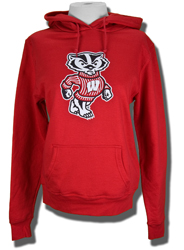Socially conscious UW apparel available at University Book Store
Just in time for the holiday shopping season, members of the campus community, parents and alumni have a brand new way to support the University of Wisconsin–Madison while also making a major difference in the lives of apparel workers in the Dominican Republic.

Through the efforts of the university’s Labor Licensing Policy Committee, UW–Madison and Bucky logoed T-shirts and hoodies produced by Alta Gracia Apparel are now on sale at University Book Store.
The brand, named for Villa Altagracia, the town in the Dominican Republic where the company’s factory is located, is pioneering a new business model that gives the workers who sew the clothing a pathway out of poverty.
The “fair labor” model pays 130 unionized workers a wage that is three times the local minimum wage — $114 per week, versus $33. The increase enables workers to provide adequate food, clean water, clothing, shelter, health care, child care and education for themselves and their families — in short, a living wage.
“The factory opened in April 2010 but in a few short months, many of the workers have been able to make significant life changes because of their improved economic situation,” says Dawn Crim, special assistant to Chancellor Biddy Martin for community relations and liaison to the LLPC.
“Here at UW–Madison and in college communities around the country, we see this factory operation as a new business model for apparel production and hope others will follow suit over time,” she says.
The Alta Gracia initiative is just the latest in a long line of socially conscious efforts by the university to stamp out sweatshop abuses in the collegiate licensed-apparel industry.
All UW–Madison licensees commit to a code of conduct mandating humane standards of production, but Alta Gracia’s commitments go far above and beyond those requirements. The Workers Rights Consortium, an independent watchdog organization, has verified the entire production process and will monitor it on a regular basis and issue public reports.
This initiative, in particular, works thanks to strong retail partners at UBS, Crim says.
“We’re proud to offer these items,” says Patrick McGowan, University Book Store president. “These efforts continue to be important to UBS is because they’re important to our customers and the university. Our customers like to see product that supports workers earning a living wage and they reinforce that by buying the products.”
Alta Gracia items are priced at $34.99 for hooded sweatshirts and $15.99 for T-shirts, on par with other comparable merchandise, so consumers do not need to pay premium prices to participate in a positive effort.
The local availability of additional fair trade or labor apparel is the realization of a long-held hope for the university’s Labor Licensing Policy Committee to find “designated suppliers” that will produce high quality products in worker-friendly environments.
Financed by Knights Apparel, Alta Gracia produces its collegiate sportswear in the former BJ&B factory, once known for labor rights abuses. To see a problem factory turn into a model one is a huge win for non-governmental organizations, students who have be advocating on behalf of workers rights and universities that have been trying to improve the apparel industry like UW–Madison, Crim says.
“We are really excited about UW–Madison’s commitment to supporting sweatshop free clothing with Alta Gracia,” says Rachel Taber, an organizer working for the brand. “We are working hard to ramp up sales across the U.S. to prove that this sort of ethical business model is viable. If successful, not only will Alta Gracia have a huge impact on the lives of workers in Villa Alta Gracia, but it has giant implications for the future of the apparel industry at large.”
Crim adds that it is important for the campus community to understand the positive developments around UW–Madison and workers’ rights spearheaded by the work of the LLPC.
UW-Madison has been a leader among colleges and universities working to curb sweatshop abuses in licensed-apparel manufacturing. The university has been persistent in its leadership on the issue and developed innovative policies, modeled by other universities across the country.
The university has contracts allowing more than 500 companies to make products bearing the university’s name or logos. The products are made in approximately 3,300 factories in 47 countries worldwide.
For more information, visit http://altagraciaapparel.com/.
Tags: licensing, student life



